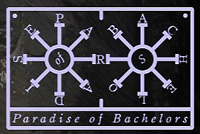Clarence Fountain & The Five Blind Boys - Look Where He Brought Me From (from Wajji LP 1305)

Look Where He Brought Me From
Part Three
In 1979, The Blind Boys were joined by the great Roscoe Robinson. As far as I can tell, that was right before the return of our man Clarence Fountain in 1980. They apparently recorded for a number of labels (like Trip and H.O.B.) during this period, and it's difficult to accurately date those 45s. I have yet to turn up any recordings that the Blind Boys made without Clarence (during the ten years he was on Jewel), but they may be out there. The only discography I can find for them is the spotty one on their current website, which doesn't cover single releases at all.
They apparently recorded for a number of labels (like Trip and H.O.B.) during this period, and it's difficult to accurately date those 45s. I have yet to turn up any recordings that the Blind Boys made without Clarence (during the ten years he was on Jewel), but they may be out there. The only discography I can find for them is the spotty one on their current website, which doesn't cover single releases at all. The Blind Boys joined with Kenny Gamble and Leon Huff in 1982 to record a great 'disco Gospel' album called I'm A Soldier In The Army Of The Lord. It's recently been released on CD, check it out. The very cool photograph above is taken from the liner notes. I'm lovin' Clarence's 'natural'!
The Blind Boys joined with Kenny Gamble and Leon Huff in 1982 to record a great 'disco Gospel' album called I'm A Soldier In The Army Of The Lord. It's recently been released on CD, check it out. The very cool photograph above is taken from the liner notes. I'm lovin' Clarence's 'natural'! In 1983, Lee Breuer, a founding member (along with Philip Glass) of the Mabou Mines Theater Company, approached the Blind Boys about appearing in his new work, The Gospel At Colonus. The play was an adatation of Sophocles' Theban Greek tragedy Oedipus Coloneus, that tells of the torment and redemption of that pathetic figure in a modern day Pentecostalist setting. It would win an Obie Award in 1984, and Breuer would 'take the show on the road' the following year.
In 1983, Lee Breuer, a founding member (along with Philip Glass) of the Mabou Mines Theater Company, approached the Blind Boys about appearing in his new work, The Gospel At Colonus. The play was an adatation of Sophocles' Theban Greek tragedy Oedipus Coloneus, that tells of the torment and redemption of that pathetic figure in a modern day Pentecostalist setting. It would win an Obie Award in 1984, and Breuer would 'take the show on the road' the following year. Playing to sold out houses throughout Europe, The Blind Boys were taking American Gospel to places it had never been before, becoming internationally known in the process. Upon their triumphant return to the States in 1987, they were featured in an Emmy award winning PBS television presentation of the play, which then moved to Broadway for a Tony nominated run in 1988.
Playing to sold out houses throughout Europe, The Blind Boys were taking American Gospel to places it had never been before, becoming internationally known in the process. Upon their triumphant return to the States in 1987, they were featured in an Emmy award winning PBS television presentation of the play, which then moved to Broadway for a Tony nominated run in 1988.They were on a roll.
 Once Oedipus had run its course, Clarence and The Boys signed with Wajji Records in Washington DC, and produced some of the best music of their career. Here they would begin their long association with Sam Butler Jr., and the Holy Ghost was in the house! That's Butler playing the incredible bass and guitar on today's selection, taken from the Wajji album Changed Man. Great God Almighty!
Once Oedipus had run its course, Clarence and The Boys signed with Wajji Records in Washington DC, and produced some of the best music of their career. Here they would begin their long association with Sam Butler Jr., and the Holy Ghost was in the house! That's Butler playing the incredible bass and guitar on today's selection, taken from the Wajji album Changed Man. Great God Almighty! I was at a Red Hot Louisiana Band show at the Stephen Talkhouse out here on eastern Long Island, and I won tickets to an upcoming show by answering some trivia question (...actually, "What was Robert Duvall's first film role?") correctly. As it turned out, the tickets were to see The Five Blind Boys Of Alabama, fresh from recording this album. To say that the show 'blew me away' would be an understatement. I had no idea what I was in for, and it literally changed my life. To this day I have never seen a more powerful performance than Clarence, The Boys, and their band put on that night.
I was at a Red Hot Louisiana Band show at the Stephen Talkhouse out here on eastern Long Island, and I won tickets to an upcoming show by answering some trivia question (...actually, "What was Robert Duvall's first film role?") correctly. As it turned out, the tickets were to see The Five Blind Boys Of Alabama, fresh from recording this album. To say that the show 'blew me away' would be an understatement. I had no idea what I was in for, and it literally changed my life. To this day I have never seen a more powerful performance than Clarence, The Boys, and their band put on that night.I sat and spoke with Clarence after the show (he sold me the record you're listening to now), and he was just so real, man. I've been a major fan ever since...
(to be continued)











